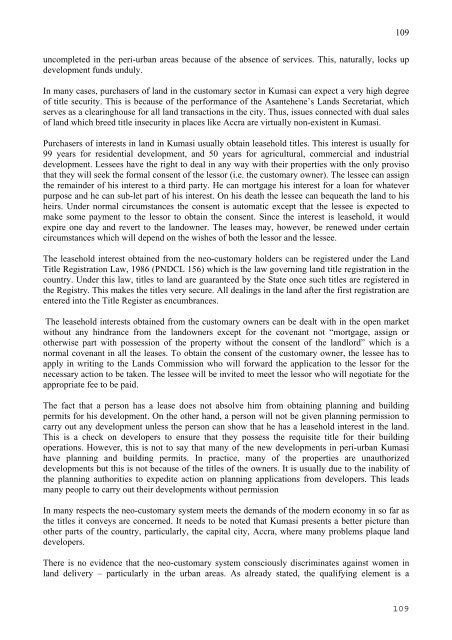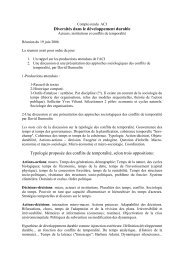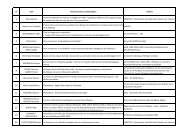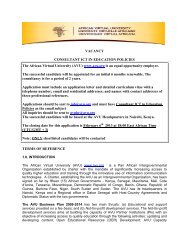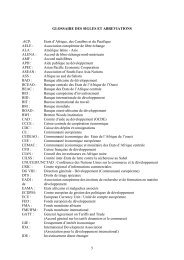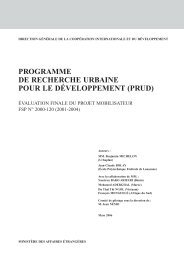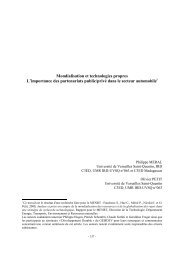Create successful ePaper yourself
Turn your PDF publications into a flip-book with our unique Google optimized e-Paper software.
109uncomp<strong>le</strong>ted in the peri-urban areas because of the absence of services. This, naturally, locks updevelopment funds unduly.In many cases, purchasers of land in the customary sector in Kumasi can expect a very high degreeof tit<strong>le</strong> security. This is because of the performance of the Asantehene’s Lands Secretariat, whichserves as a c<strong>le</strong>aringhouse for all land transactions in the city. Thus, issues connected with dual sa<strong>le</strong>sof land which breed tit<strong>le</strong> insecurity in places like Accra are virtually non-existent in Kumasi.Purchasers of interests in land in Kumasi usually obtain <strong>le</strong>asehold tit<strong>le</strong>s. This interest is usually for99 years for residential development, and 50 years for agricultural, commercial and industrialdevelopment. Lessees have the right to deal in any way with their properties with the only provisothat they will seek the formal consent of the <strong>le</strong>ssor (i.e. the customary owner). The <strong>le</strong>ssee can assignthe remainder of his interest to a third party. He can mortgage his interest for a loan for whateverpurpose and he can sub-<strong>le</strong>t part of his interest. On his death the <strong>le</strong>ssee can bequeath the land to hisheirs. Under normal circumstances the consent is automatic except that the <strong>le</strong>ssee is expected tomake some payment to the <strong>le</strong>ssor to obtain the consent. Since the interest is <strong>le</strong>asehold, it wouldexpire one day and revert to the landowner. The <strong>le</strong>ases may, however, be renewed under certaincircumstances which will depend on the wishes of both the <strong>le</strong>ssor and the <strong>le</strong>ssee.The <strong>le</strong>asehold interest obtained from the neo-customary holders can be registered under the LandTit<strong>le</strong> Registration Law, 1986 (PNDCL 156) which is the law governing land tit<strong>le</strong> registration in thecountry. Under this law, tit<strong>le</strong>s to land are guaranteed by the State once such tit<strong>le</strong>s are registered inthe Registry. This makes the tit<strong>le</strong>s very secure. All dealings in the land after the first registration areentered into the Tit<strong>le</strong> Register as encumbrances.The <strong>le</strong>asehold interests obtained from the customary owners can be dealt with in the open marketwithout any hindrance from the landowners except for the covenant not “mortgage, assign orotherwise part with possession of the property without the consent of the landlord” which is anormal covenant in all the <strong>le</strong>ases. To obtain the consent of the customary owner, the <strong>le</strong>ssee has toapply in writing to the Lands Commission who will forward the application to the <strong>le</strong>ssor for thenecessary action to be taken. The <strong>le</strong>ssee will be invited to meet the <strong>le</strong>ssor who will negotiate for theappropriate fee to be paid.The fact that a person has a <strong>le</strong>ase does not absolve him from obtaining planning and buildingpermits for his development. On the other hand, a person will not be given planning permission tocarry out any development un<strong>le</strong>ss the person can show that he has a <strong>le</strong>asehold interest in the land.This is a check on developers to ensure that they possess the requisite tit<strong>le</strong> for their buildingoperations. However, this is not to say that many of the new developments in peri-urban Kumasihave planning and building permits. In practice, many of the properties are unauthorizeddevelopments but this is not because of the tit<strong>le</strong>s of the owners. It is usually due to the inability ofthe planning authorities to expedite action on planning applications from developers. This <strong>le</strong>adsmany peop<strong>le</strong> to carry out their developments without permissionIn many respects the neo-customary system meets the demands of the modern economy in so far asthe tit<strong>le</strong>s it conveys are concerned. It needs to be noted that Kumasi presents a better picture thanother parts of the country, particularly, the capital city, Accra, where many prob<strong>le</strong>ms plaque landdevelopers.There is no evidence that the neo-customary system consciously discriminates against women inland delivery – particularly in the urban areas. As already stated, the qualifying e<strong>le</strong>ment is a109


